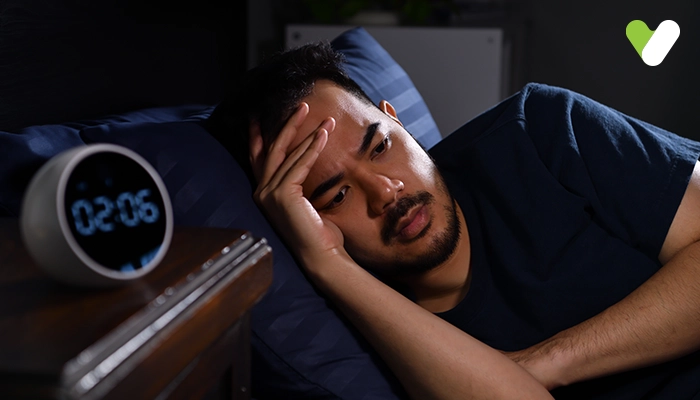Imagine waking in the middle of the night, your mind churning, the clock ticking, and sleep becomes an unreachable dream. But for millions across the world, it's not one of those nights, it's war every single night. Take, for instance, Sarah, a 35-year-old professional started having sleep problems after a very stressful incident concerning her job. A few nights without sleep escalated into months of chronic insomnia, leaving her tired, short-tempered, and pretty much desperate for anything that could help. Sarah's is not all that unique a story after all research indicates that roughly 30% of adults have symptoms of insomnia, while about 10% suffer from chronic insomnia (National Institutes of Health, 2020).
Some common provoking factors that cause insomnia are included in detailed information in this blog. The blog also gives general information about Cognitive Behavioral Therapy for insomnia and some typical symptoms of sleep deprivation.
What is Insomnia?
It has been defined as the difficulty falling asleep, staying asleep, or early awakening and not being able to fall back to sleep.Insomnia can be acute (short-term) or chronic (long-term)Acute insomnia is temporary, usually caused by some undue stress or some major life event, and might last from several days to a few weeks. On the other hand, insomnia is termed chronic if it occurs at least three times a week and stays with a person for three months or more.
While insomnia is common among men and women and across all age groups, older adults and women experience markedly increased risk for this disorder.
As to why women are more likely to develop insomnia, this can be attributed to hormonal changes associated with menstruation, pregnancy, and menopause. According to a study by the American Academy of Sleep Medicine, women are 40% more likely than men to report insomnia regularly (2022).
Causes of Insomnia
The causes of insomnia are many and can be subdivided into several general areas:Stress: Generalized causes that can result in short-term insomnia include work stress, financial worries, or major life events, like the death of a loved one.
Anxiety and Depression: This type of mental disorder is very closely associated with sleep disturbances, especially anxiety and depression.
Bad Sleeping Hygiene: Engaging in activities such as watching movies or using gadgets, which stimulate the mind, gives rise to bad sleeping hygiene and, in turn, leads to insomnia.
Medications: Certain medications, such as sildenafil, tricyclic antidepressants, monoamine oxidase inhibitors,
Medical Conditions: Painful disorders, arthritis, asthma, and even gastrointestinal problems like acid reflux interfere with sleep.
Substance Use: Caffeine, nicotine, and alcohol are potent disruptors of sleep. While alcohol may help the onset of sleep, it disrupts sleep stages in the second half of the night.
Lifestyle Factors: Working on night shifts, jet lag, or irregular working hours, lifestyle acts as a disservice to the sleeping pattern of the body, thus leading to insomnia.
Also Read : Reality Vs Myth: Is the Eight Hours of Sleep Rule a Myth?
Symptoms of Insomnia
The repercussions of insomnia encompass further than sleeplessness and entail bad sleeping that ruins physical and emotional general health.- Difficulty maintaining sleep: Uninterrupted time awake during sleep with partial inability to fall asleep.
- Night Wakings: Awakening more than once during the night.
- Waking Up Too Early: Rising before the desired time and not being able to fall back asleep.
- Daytime Fatigue: Throughout the day, an unpleasant feeling of fatigue is present, despite a full night's rest.
- Mood swings or irritability Increased irritability, anxiety, or depression owing to lack of quality sleep,
Best Suitable Treatments for Insomnia
Of course, an effective cure for insomnia depends on its causes and severity. Below is the most common type of treatment:- Medications: Doctors can recommend medication and sleep aids or prescribe ones for short-term use.
- Therapies: Insomnia-specific cognitive behavioral therapy represents the gold standard and is to be considered the first-line management.
- Complementary Therapies: Some have found relief from other therapies, like meditation, or yoga.
Also Read : Does Lack Of Sleep Cause Diabetes
Cognitive Behavioral Therapy for Insomnia
CBT-I is structured as a class that helps a person identify and change thoughts and behaviors that relate to their sleep issues. Unlike sleep medications, it treats the underlying causes of insomnia and will promote a change in a pattern of sleep that will last over the long haul. A typical session will include:- Sleep Education: Learn your sleep cycles and what good sleep hygiene is.
- Sleep restriction: Limiting time in bed to the extent of upcoming sleep onset and increasing it gradually with improved sleep.
- Stimulus Control
- Cognitive restructuring: Recognize and challenge negative cognitions related to sleep, for example, fear of falling asleep.
- Relaxation Techniques: Engaging exercises to relax both the body and mind while preparing for sleep.
Conclusion
More than a sleepless night, insomnia is a disorder if not treated properly, and may affect your life. Knowing the causes and identifying the symptoms by receiving appropriate treatment, such as cognitive-behavior therapy for insomnia, will help in bringing improvement in sleep and restoration to life. Never be afraid to seek help regarding your sleep.References:
- Kaur H, Spurling BC, Bollu PC. Chronic Insomnia (https://www.ncbi.nlm.nih.gov/books/NBK526136/#article-19531.s8). [Updated 2022 Jul 12]. In: StatPearls [Internet]. Treasure Island (FL): StatPearls Publishing; 2022 Jan-. Accessed 8/25/2024.
- Romy Khan. Ayush Next [Internet]: Ministry of Ayush (Govt. of India); How to cure insomnia; [cited 2024 Aug 20]; Available from: https://ayushnext.ayush.gov.in/detail/post/how-to-cure-insomnia
- Rob Newsom, Alex Dimitriu; Sleep Foundation[Internet].[updated 2024 May 7].Cognitive Behavioral Therapy for Insomnia (CBT-I): An Overview; [cited 2024 Aug 30]; Available from: https://www.sleepfoundation.org/insomnia/treatment/cognitive-behavioral-therapy-insomnia
- Suchandrima Bhowmik. What causes insomnia and how to treat it?;[published 2022 July 5]; [cited 2024 Aug 23]; Available from: https://www.news-medical.net/news/20220705/What-causes-insomnia-and-how-to-treat-it.aspx


